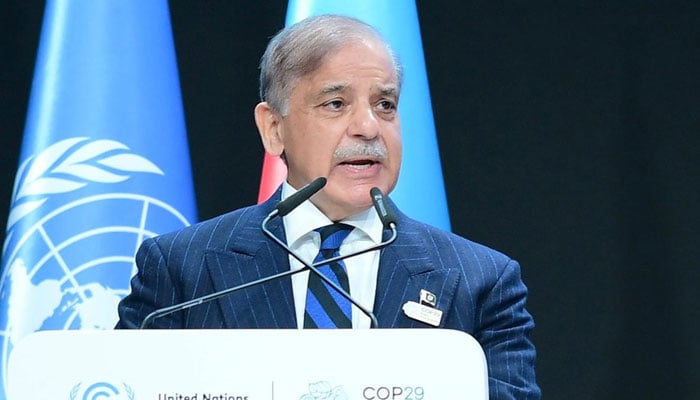Pakistan pushes for fulfilment of previous climate pledges at COP29 summit
Premier Shehbaz says countries cannot put up real resilience against climate change without necessary financing
Prime Minister Shehbaz Sharif called on wealthy nations to fulfil the financial commitments made in previous climate summits, emphasising the importance of supporting developing nations in managing climate impacts.
"COP29 should make this understanding loud and clear that we will have to fulfil those financial pledges committed in COP27, COP28," the premier told the COP29 Climate Action Summit being held in Baku, Azerbaijan.
Around 200 nations are negotiating global action on climate change at the summit aimed at climate fund raising to help transition to clean energy and adaptation to a warmer world.
The summit seeks to reach a deal that ensures up to trillions of dollars in financing for climate projects worldwide.
Climate change remains a point of concern and contention for countries around the world who are now fighting over climate finance regarding the phenomenon affecting people all around the world.
"I would not want other countries to face the plight Pakistan faced back in 2022. Pakistan is a resilient, hard-working, and responsible nation. We are fully committed to being part of the global climate solutions," said PM Shehbaz.
"As the minus-one emitters, we should not brave the impact of immissions realised by others without even the tools to finance resilience. Without climate justice, there can be no real resilience," he added.
The PM said that the incumbent government in the country has taken concrete actions to deliver on its commitment to producing 60% of all energy from clean sources and shifting 30% of our vehicles to electric vehicles (EVs) by the end of this decade.
At the same time, Pakistan is going to go through a renewable energy revolution, he added.
The premier told the summit that last year, Pakistan presented a comprehensive national adaptation plan and developed its carbon market framework by 2024.
He, however, underscored that the country cannot reach the goal on its own and needs international support to deliver on its climate ambitions.
PM Shehbaz said that the developing countries will need an estimated $6.8 trillion by 2030 to implement less than half of their current NDCs. The same goes for adaptation and loss and damage.
"In COP27, Pakistan led this phenomenon. I strongly feel that climate finance must be grant-based and not add to the debt burden of developing countries. Finally, two years ago, I warned at the top of my voice that the future would never forgive our inaction, today, I echo the same," he noted.
The premier's remarks come as the country ranks as the fifth most climate-vulnerable country globally, as per the Global Climate Risk Index. The catastrophic floods in 2022 resulted in over 1,700 deaths, affected 33 million people, and caused economic damage surpassing $30 billion.
While international donors committed over $9 billion for recovery efforts, officials report that very little of this aid has been received thus far.
In 2009, the wealthy countries pledged to contribute $100 billion a year to help developing nations cope with the costs of a transition to clean energy and adapting to the conditions of a warming world.
Those payments began in 2020 but were only fully met in 2022. The $100 billion pledge expires this year.
Countries are negotiating a higher target for payments starting next year, but some have been reluctant to confirm its size until it is clear which countries will contribute.
Instead, they are circling around the idea of a multi-layered target, with a core amount from wealthy countries' government coffers, and a larger sum that includes financing from other sources such as multilateral lending institutions or private investors.
In the past, public money made up the bulk of contributions to the $100 billion goal.
Climate change has accelerated globally, as human activities — mainly, burning fossil fuels — have heated up the planet's long-term average temperature by around 1.3°C, turbocharging disastrous floods, hurricanes and extreme heatwaves.
The countries' plans for emissions cuts are not enough to slow climate change, and would instead lead to far worse warming.
According to scientists, next year's UN deadline for countries to update their national climate plans is the last opportunity to avert disaster.
Negotiators have said a failure at COP29 to produce a major funding deal could result in countries offering weak climate plans on the grounds that they cannot afford to implement more ambitious ones.
Most of the world's climate-friendly spending so far has been skewed towards major economies such as China and the US. Meanwhile, Africa's 54 countries received just 2% of global renewable energy investments over the last two decades.
-
Security forces gun down 30 terrorists in multiple IBOs in KP: ISPR
-
MQM-P calls for new province in Sindh
-
US report validates Pakistan military edge over India: PM
-
Banned TTP poses serious threat to Pakistan security: UNSC panel
-
CM Afridi clarifies remarks on by-poll after ECP requests army deployment
-
Dubai sees 3.2m Pakistani passengers in 2025 as airport sets new milestone
-
Security forces kill 23 Indian proxy terrorists in KP's Kurram
-
Pakistan to construct island to boost oil exploration: report












